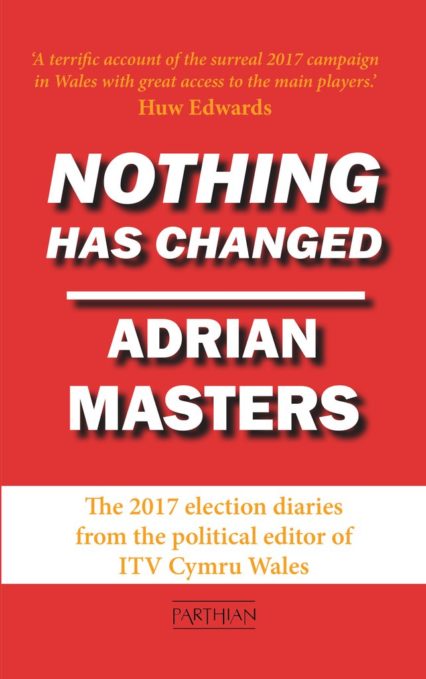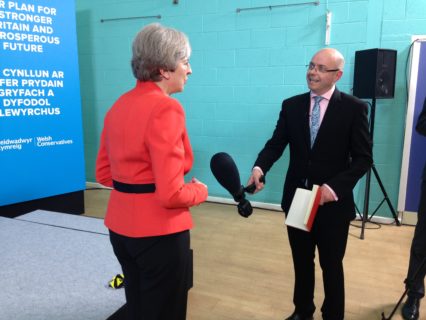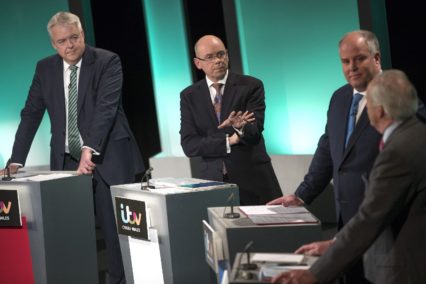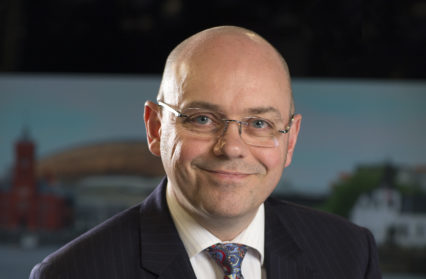Adrian Masters, political editor of ITV Wales Cymru, has long spoken of his privileged position when it comes to his proximity to the halls of power. Finally, spurred on with the events of one of the most remarkable General Elections of the modern age, he has committed his insight in a fascinating, revelatory Election Diary, based upon the copious notes he makes during his working day. Here he talks to Gary Raymond about putting the book together, the art of writing political diaries, and just what state politics is in in the wake of the 2017 Election.
Now, isn’t it true you’ve kept a political diary for as long as you’ve been in the business – so what was it about this last general election that compelled you to turn it into a book for public consumption?
I don’t keep a formal diary but I do keep very detailed notes of each event I attend and conversation that I have, sometimes with notes about what was happening in the sidelines of the conversations. For this book I added texts, emails, social media messages and what was said to me and by me in interviews and on air.
Politics was already clearly in a time of transition and had been since at least the time of Scotland’s Independence referendum in 2014 – certainly since the EU referendum in 2016. That change was obviously accelerating when the snap election was called and it seemed it would be an election that was historically important. It was, but for different reasons. I wanted to demonstrate how that change happened and how it was conveyed to me through the various conversations I was having day by day.
I’m extremely privileged to occupy a unique position in the Welsh political media in that I divide my time between Westminster and Cardiff Bay and I realised that at a time of election that gives me an extraordinary vantage point. I wanted to get across a sense of what it’s like doing my job and the frantic, chaotic flow of information that floods my days. Some of that information is right, some of it’s wrong, some of it’s misinformation, some of it’s bland, but all of it’s revealing in different ways and when combined.
It’s also great fun to do my job. The nosy parker in me loves being on the receiving end of all that information and knowing some of what goes on behind closed doors. It’s also really enjoyable to be a broadcaster during elections: travelling a lot, broadcasting a lot, some of it through the night and then of course the adrenaline rush of live TV debates. It’s a huge amount of fun. I hope the book shows that.
 How do you account for the nature of the election, now there has been a little bit of time for the dust to settle?
How do you account for the nature of the election, now there has been a little bit of time for the dust to settle?
There were some straightforward political errors, most notably that the Conservatives plumped for an overly-centralised campaign and failed to adapt when it started becoming clear it wasn’t working.
There was a considerable personal element: people began by trusting Theresa May more than any other frontline politician and distrusting Jeremy Corbyn. Then enough of them changed their mind on both. The use of social media played a very significant part in that. In 2015 the Conservatives had the upper hand in those terms but in the intervening two years the way people use social media has transformed and Labour and Labour supporters grasped it in a way other parties didn’t.
Something else that had changed too: canvassing techniques. Both Conservative and Plaid Cymru people complained to me about ‘bonkers’ canvassing methods, methods which had worked well in identifying swing voters in previous years but was hopeless in the volatility of this campaign.
Do you think we have been able to see the real fallout of this election yet, or is it still playing out?
In big picture terms every day shows that the ripples are still being felt: Theresa May’s weakened support has played out in the rollercoaster of Brexit talks.
In purely party terms, Labour’s leadership soap opera is over but its fault lines remain. The Conservative leadership soap opera is bubbling away. Plaid Cymru is at one of those crossroad moments when it decides what sort of party it wants to be. Leanne Wood thinks she has the support to keep driving but others think they need a go in the driving seat.
Wales had some surprising walk-on parts in this election, where it is normally ignored – certainly by the Conservatives. Quite a bit of the drama of the book comes from the unusual polls, for instance, that showed the Tories to be doing extremely well in Wales. Can you speculate a little as to why Wales was so important to this election, and why the polls proved to be so wide of the mark?
I don’t believe that the YouGov polling which we commission jointly with Cardiff University was wide of the mark. Our final Welsh Barometer poll of the campaign figures were very close to the actual vote shares in Wales on election day. I think the Barometer showed the change that happened. The Conservatives really were looking at historic gains at the beginning of the campaign and Labour really was looking at historic losses before their fortunes changed. Every conversation I had during the campaign and in the interviews I conducted for the book backed that up.
You say that the Conservatives ignore Wales. Senior Welsh Tories that I quote in my book certainly think they were ignored this time around but in the past that hasn’t been the case. 2015 saw a lot of success for the party when it fully involved the Welsh wing and turned a lot of its campaign focus on Labour’s record in Wales. They seemed to forget those lessons this time and that certainly contributed to their problems although the Corbyn surge was a much bigger factor.

In stark contrast, Welsh Labour seized on pre-election division and distrust of Jeremy Corbyn to make the most of its newly increased autonomy and fashion a much more ‘Welsh’ campaign than it’s ever led before. Although they deny that amounted to ‘distancing’ it certainly didn’t do any harm when the Corbyn surge happened. Corbynistas think that narrative plays down the Corbyn surge but I quote Welsh Tories noting approvingly that their Labour opponents were able to ‘ride two horses.’
Strangely enough the pivotal moment that gave me my title for the book may have taken place in Wales but was concerned with a policy (social care payments) which wouldn’t affect Wales and was part of the launch of a Welsh manifesto which contained little Welsh-specific content.
The parties were guilty anyway of muddying the water when it comes to devolution. For instance three of Welsh Labour’s five key pledges were in devolved areas that nobody being elected could directly deliver.
The title of your book is somewhat ironic, taking Theresa May’s vehement denial that anything had changed during one of her several campaign u-turns. Do you think politics itself would benefit from a indulging in a bit more irony?
People at Gresford were flabbergasted by Theresa May saying ‘nothing has changed’ when the policy she was talking about clearly had. Conservatives there may not have had their heads in their hands but they were very quiet.
Do you think journalism and the media in general in Wales have to carry some of the can for the apparent disconnect between the people and the political machine?
There are different types of political journalism. What I do can perhaps be summed up simply as reporting what government parties say and do along with what other parties say about that and what they say they’d do differently. There’s obviously a call for political journalism with opinions but that’s not what I do nor would I want to. I’m not part of government nor of opposition: I report on what I hope are the most interesting things they get up to.
Increased cynicism about the ‘mainstream media’ worries me. Nothing’s ever perfect but the efforts to be fair and objective made by broadcast news outlets like ITV and the BBC are considerable and the alternative is not necessarily better. Fake news isn’t just a phenomenon on one side of the political divide.
The world of politics moves extremely quickly of course, and it seems have been moving even quicker the last two years or so, and so getting a book out that is immediate and remains relevant is quite a challenge. How did you approach that challenge for this book?
It was important that the book came out this year. Politics is moving so quickly that it was always going to be a slice of history. As it happens, things have changed in such a dramatic and dark way since I finished it that some of it seems ancient history.
Can you pick a few significant ways your book has set us up for what happens next?
It shows a return to two party politics which provides a significant challenge to Plaid Cymru. I expect that in the first part of 2018 Plaid will focus on how it will face that challenge.
You can also seen the tensions within the two big UK parties: Corbynistas versus Welsh Labour; Conservative Brexiteers versus Remainers; Conservative supporters of more autonomy for the Welsh party between those who still look to London. Those tensions will continue.
In Welsh politics what happens next will depend to a very large extent on the political impact of the inquiries into issues surrounding Carl Sargeant’s death. My book went to the printers on the day that he died and nothing in it offers any clues as to whether or not the ramifications will bring the end of Carwyn Jones’ time as First Minister closer.

Do you see this current climate as part of the new order coming through – a symptom of the cultural shifts happening across the western world – or is it an isolated, Welsh scandal that would have probably come about in one form or another regardless?
I can’t pretend to know what was going through Carl Sargeant’s mind. I’ll leave that to the Coroner’s inquest. His was a personal tragedy that took place in a political context and has had political consequences.
There is a change in culture that’s taking place about the sort of behaviour that’s appropriate in public and private. Politics has always been a sphere of life that is part public and part private and I don’t doubt there are other allegations to be made. Carl Sargeant’s death has perhaps made people who are thinking about the way such allegations are dealt with think more carefully about the accuser as well as the accused but I’m pretty sure the changes in culture and processes will continue.
How important do you think it is for people in your position to open the doors to behind-the-scenes, as it were, with books like Nothing Has Changed?
There’s probably a public service of some sort but honestly I really just hope it gives people a sense of the excitement and the dizzying range of different opinions and information that swirls around me. It’s a great job, I’m very lucky to do it and I hope this book will show why.
And given the political turmoil continuing, do you see this book as the first of many?
I hope so. I had to stop writing because I was on my way towards writing a book that would have been twice the length. I have a ready-made title for a second volume too: Everything Has Changed.
Nothing Has Changed is available now from Parthian Books.
Adrian Masters is the Political Editor of ITV Cymru Wales. He presents the weekly political programme, Sharp End, and hosts live leaders’ debates and election coverage. In recent years, he’s also become an unlikely TV chef with the programme Adrian’s Welsh Bites in which he makes a meal with the person that he’s interviewing. He has twenty-five years’ experience as a broadcast journalist and has been a reporter and presenter in both radio and television.



 Enjoyed this article? Support our writers directly by buying them a coffee and clicking this link.
Enjoyed this article? Support our writers directly by buying them a coffee and clicking this link.








